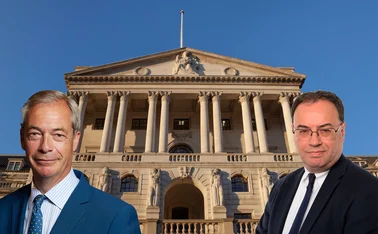
Robert Pringle’s Viewpoint: Rebalancing the fraught relationship between governments and central banks

As has frequently been noted, not least by Central Banking, central banks have come out of the global financial crisis with enhanced powers and added responsibilities. Governments look to them not only as the main instruments for keeping economies from slipping back into recession but also for two other crucial tasks: to re-float the financial system - at least in those countries where it has been on crutches - and to take the lead in ensuring the system does not crash again. What are the implications of this new phase in central banks' historically fraught relationship with governments?
The policies required of central bankers to combat the crisis - and, especially in emerging markets, react to large cross-border capital flows and other challenges raised by ultra-low rates in key currencies - have already involved central bankers making difficult judgements. In addition to the usual challenges of balancing economic risks - such as inflation on the one hand and avoidable unemployment on the other - they have also had to make decisions about what may be termed ‘constitutional' issues. For example, about what they can do, as unelected officials, on their own initiative without the endorsement of government compared with decisions that require approval from the legislature or executive branch.
Politicisation and domination
Quantitative easing (QE) and credit easing policies have more overt distributional effects than those that naturally result from monetary policy actions in ‘normal' times. Decisions about what kind of assets a central bank should purchase have clear fiscal and distributional implications, which is why some central bankers insist that such decisions should be made by elected governments. Others see a clear trend towards politicisation, if not political domination.
New complications arise from macro-prudential policy. Although institutional arrangements vary widely by jurisdiction, everywhere the central banks (or agencies in which they have a major role to play) are being equipped with an array of tools such as loan-to-value ratios, counter-cyclical capital ratios, sectoral capital requirements, time-varying reserve ratios, caps on leverage and the like. Central bankers are well aware that use of such tools can have a major impact on individual citizens and therefore require a high level of public acceptability and accountability. At the same time, in some jurisdictions, the central bank also has to conduct, or have major responsibility for, micro-supervision of individual financial firms as well. In the European Union (EU), responsibility for banking supervision is being transferred from the national authorities to the European Central Bank. In the UK, a far-reaching restructuring of the Bank of England came into force in April.
Are there risks to democracy? I stand to be corrected, but I am not aware of a case where a central bank has deliberately attempted to usurp the prerogatives of elected governments. It is true that some have wielded wide discretionary powers by default. For decades, before the introduction of the euro, the Bank of Italy was the dominant influence on economic and monetary policies in Italy - it was often said to ‘run Italy'. This was because Italian politics were chaotic, to say the least, and the country had long periods without an effective government. The central bank was among the few trusted institutions able to give consistency as well as credibility to policy. In many other countries, especially in emerging markets, finance ministry officials have routinely jumped ship to the central bank.
A stable relationship?
Yet now central bankers are being thrust into roles in which many feel uncomfortable - roles that potentially give them quasi-executive powers that go beyond their natural remit or mandates. At a time of continued economic malaise, is the balance of power between legislatures, central banks and the executive arm of governments likely to prove stable? ‘Probably not', is the safe answer. In which case, how will the tensions be resolved?
This question was raised by John Gieve in a May 29 lecture at University College London, where he is a visiting professor. With experience on both sides, as a former deputy governor of the Bank of England and a former senior official in the UK Treasury, his views merit attention.
Before the crisis, said Gieve, there was a clear allocation of responsibilities between central banks (stabilisation), structural issues and fiscal matters (finance ministries) and financial market oversight (various regulatory and financial conduct bodies). Everybody accepted that monetary policy should be kept as far away from politics as possible. This propelled professional economists into key policy-making positions for the first time.
Then along came the financial and economic crash - which was not a ‘Black Swan' event, but an event generated by the dynamics of the system. Yet the policy response has been to ‘double up'. Reforms have essentially consisted of ‘more of everything'. Yet this did not take account of the most obvious fact about the pre-crisis regime: its spectacular failure.
Single-minded pursuit of the inflation objective has not brought stability. Central bankers are not convincing when they say that monetary policy had nothing to do with the collapse (and some have started to change their tune on this - see Robert Pringle's Viewpoint: Watch what central bankers do, not what they say). Governments encourage central banks to ignore inflation targets when it suits them. Yet there has been no serious rethinking of monetary policy frameworks.
Meanwhile, the exercise of macro-prudential policy tools (for example, raising capital ratios) has been pro-cyclical as well as restricting lending and demand. There have been two feet on the brakes - fiscal and regulatory policies - and one foot on the monetary policy accelerator. Does this add up to a coherent strategy?
Accountability gap
Also, a gap has opened up between power and accountability. Central banks have the power, while governments are being held accountable - almost all the governments in power when the crisis broke (Germany's coalition under chancellor Angela Merkel so far being one of the exceptions) have been booted out of office, yet central banks have sailed through the crisis. This is not a sustainable position.
Predictably, governments are becoming more assertive (call it ‘interference' if you like). UK Chancellor of the Exchequer George Osborne has taken to writing letters to the Bank of England that are typical of the new tone that finance ministers are adopting towards their central bankers - much more intrusive and assertive than they were pre-crisis.
Governments and legislatures could well mount a fundamental assault on central bank independence. For example, Gieve asked, what would happen if a central bank were to say ‘We have done enough to promote recovery and we have reached our limit - now it is over to you'? Or, the central bank governor might tell his government to use fiscal policy instead of looking for more quantitative easing. Or, a new government such as that of prime minister Shinzo Abe in Japan could install his own team at the central bank with instructions to embark on an entirely new strategy.
I agree that the present imbalance of power does not look stable. But in my view this is because governments have loaded too much on to the central banks. I do not think they should conduct micro supervision as well as macro, for example.
The easy way out is to call for the accountability of central banks to be enhanced. That is needed but not enough. Their mandates should be confined to the pursuit of objective and clearly defined goals where their special expertise is of the essence. As Jens Weidmann, president of the Deutsche Bundesbank, puts it in the May 2013 edition of Central Banking: "The eurosystem - like other central banks round the world - has taken considerable risks, and it has stretched its mandate..."
Only users who have a paid subscription or are part of a corporate subscription are able to print or copy content.
To access these options, along with all other subscription benefits, please contact info@centralbanking.com or view our subscription options here: subscriptions.centralbanking.com/subscribe
You are currently unable to print this content. Please contact info@centralbanking.com to find out more.
You are currently unable to copy this content. Please contact info@centralbanking.com to find out more.
Copyright Infopro Digital Limited. All rights reserved.
As outlined in our terms and conditions, https://www.infopro-digital.com/terms-and-conditions/subscriptions/ (point 2.4), printing is limited to a single copy.
If you would like to purchase additional rights please email info@centralbanking.com test test test
Copyright Infopro Digital Limited. All rights reserved.
You may share this content using our article tools. As outlined in our terms and conditions, https://www.infopro-digital.com/terms-and-conditions/subscriptions/ (clause 2.4), an Authorised User may only make one copy of the materials for their own personal use. You must also comply with the restrictions in clause 2.5.
If you would like to purchase additional rights please email info@centralbanking.com test test test








